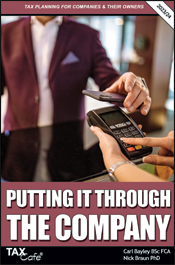Company Tax Planning Guide from Taxcafe
In previous articles we have looked at a comparison of the tax payable by company owners and sole traders and partnerships. It was shown that using a company could save you thousands of pounds in tax every year, especially if you are reinvesting your profits.
Taxcafe has a popular tax planning guide for company owners. It covers ALL the expenses you can claim: Putting It Through the Company
These tax savings could increase further because the Conservative-Lib Dem coalition agreement states that corporation tax rates will be reduced.
As a result we could see the tax rate for big companies fall from 28% to 25% and the small companies rate (profits under £300,000) could be reduced from 21% to 20%.
(Remember the small companies rate was due to increase to 22% from April next year, so many company owners could be paying almost 10% less tax than previously thought.)
We don’t know when these corporation tax cuts will take place but we hope it will be from April next year.
Clearly, there are significant tax savings to be had by using a company. However, there are also non-tax reasons why you may wish to use a company and there are also other tax and non-tax reasons why you may wish to operate your business as a sole trader or partnership.
Non-tax reasons for using a company include:
Limited liability protection: In layman’s language, this means that a company’s shareholders are generally not responsible for the company’s debts and cannot be sued by outsiders. This is one of the most important reasons for setting up a company and could potentially be as valuable as the tax savings.
Ownership flexibility: Using a company can make it easier to involve new people (e.g. adult children or loyal employees) in the ownership of the business.
Succession: This is probably the most important issue facing business owners close to retirement. Companies are useful for succession planning because they carry on when the original owner dies or retires.
Although using a company may save you tax, and confers other benefits, operating as a sole trader or partnership offers the following benefits:
Lower costs: Company owners have to complete a corporation tax return and complete annual accounts that are filed with Companies House. Accountants charge more for these services. The extra fees could be anything from a few hundred pounds to over £1,000.
Bigger pension contributions: If you want to contribute more than £2,880 a year to a pension, you generally have to have earnings. The profits of a sole trader business or partnership usually count as earnings, as does the £5,715 salary many company owners take.
Dividends, however, are classified as investment income, so you cannot base your pension contributions on them.
The best solution for most company owners is to get the company to make pension contributions on their behalf. These are certainly very tax efficient, as they generally provide corporation tax relief for the company and also avoid national insurance.
However, in some cases, there can be a risk that HMRC will deny tax relief if the pension contribution, together with the director/shareholder’s other remuneration, amounts to more than a commercial rate of pay for the job they do for the company. No such restriction applies to pension contributions made by sole traders or partners, although other limits do apply.
This problem is fairly rare but could affect any company owner who does not play a fully active role in the day to day management of their business.
Business cash: Self-employed business owners who have a lot of cash sitting in their business bank accounts can store it in tax-free ISAs. They can also use an offset mortgage to set their surplus business cash against the mortgage on their home.
What this means in practice is that someone paying, say, 4% interest on their home mortgage can effectively earn 4% tax free on the cash in their business bank account.
Company owners cannot offset the cash sitting in their company bank accounts against their personal mortgages. And, to add to the pain, company bank accounts currently pay very low rates of interest (often as low as 0.1%) and the interest is fully taxable.
Cars: The tax on company cars has been steadily increasing in recent years and is only set to get worse.
Any business owner who relies significantly on their car for business should be sure to take account of the different tax rules which would apply if they used a company. In extreme cases, the difference can be enough to make the company less tax efficient overall.
Converting to a Company
If you have an existing sole trader business or partnership you may be interested in converting to a company to reap the potential tax benefits.
There are special tax laws that allow you to do this tax free. However, there are quite a lot of i’s to dot and t’s to cross, so you can expect to rack up some professional fees.
These will have to be weighed against the potential tax savings.




